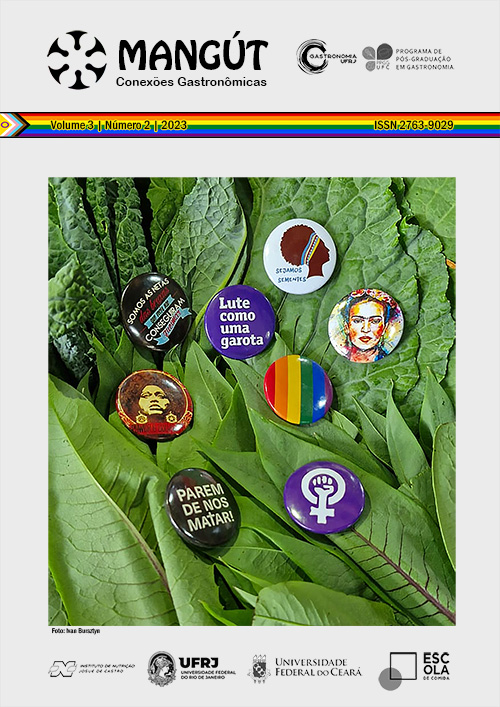Masculinidade na cozinha: episódios de machismo e violência simbólica no programa MasterChef
DOI:
https://doi.org/10.70051/mangt.v3i2.61339Parole chiave:
Gastronomia, Machismo, Masculinidade hegemônica, Reality show, Inclusão.Abstract
O boom dos reality shows de gastronomia no Brasil influenciou a indústria culinária e expôs questões de desigualdade de gênero e violência simbólica, enfatizando a importância de questionar e reestruturar essas configurações a fim de promover ambientes culinários mais inclusivos e equitativos. O objetivo desse artigo foi identificar e analisar episódios de discriminação de gênero no programa televisivo MasterChef sob a luz dos conceitos de masculinidade e de violência simbólica de Bourdieu, a partir de dois métodos: a pesquisa bibliográfica e o levantamento e análise de dados no programa MasterChef. Pode-se observar com os trechos de falas destacados que a violência simbólica se faz presente e muitas vezes não é percebida pelos agentes que a praticam ou que recebem, com reprodução de estereótipos de gênero, inclusive entre as participantes femininas do programa. Observou-se também como a violência simbólica opera nesses programas de gastronomia, reforçando normas de masculinidade e feminilidade que perpetuam as desigualdades na indústria culinária. Embora esta pesquisa tenha proporcionado uma visão ampla do tema, futuras investigações podem aprofundar a temática com estudos de caso e entrevistas diretas. Destaca-se a importância da conscientização, liderança e desconstrução das normas de gênero para criar ambientes de trabalho mais inclusivos e respeitosos, contribuindo para um campo profissional mais igualitário.
##submission.downloads##
Pubblicato
Fascicolo
Sezione
Licenza
Copyright (c) 2024 Luca Souza Moreira, Camila Pinheiro Coura, Daniela Alves Minuzzo

TQuesto lavoro è fornito con la licenza Creative Commons Attribuzione 4.0 Internazionale.
Autores que publicam nesta revista concordam com os seguintes termos:
- Autores mantém os direitos autorais e concedem à revista o direito de primeira publicação, com o trabalho simultaneamente licenciado sob a Licença Creative Commons Attribution que permite o compartilhamento do trabalho com reconhecimento da autoria e publicação inicial nesta revista.
- Autores têm autorização para assumir contratos adicionais separadamente, para distribuição não-exclusiva da versão do trabalho publicada nesta revista (ex.: publicar em repositório institucional ou como capítulo de livro), com reconhecimento de autoria e publicação inicial nesta revista.
- Autores têm permissão e são estimulados a publicar e distribuir seu trabalho online (ex.: em repositórios institucionais ou na sua página pessoal) a qualquer ponto antes ou durante o processo editorial, já que isso pode gerar alterações produtivas, bem como aumentar o impacto e a citação do trabalho publicado (Veja O Efeito do Acesso Livre).



